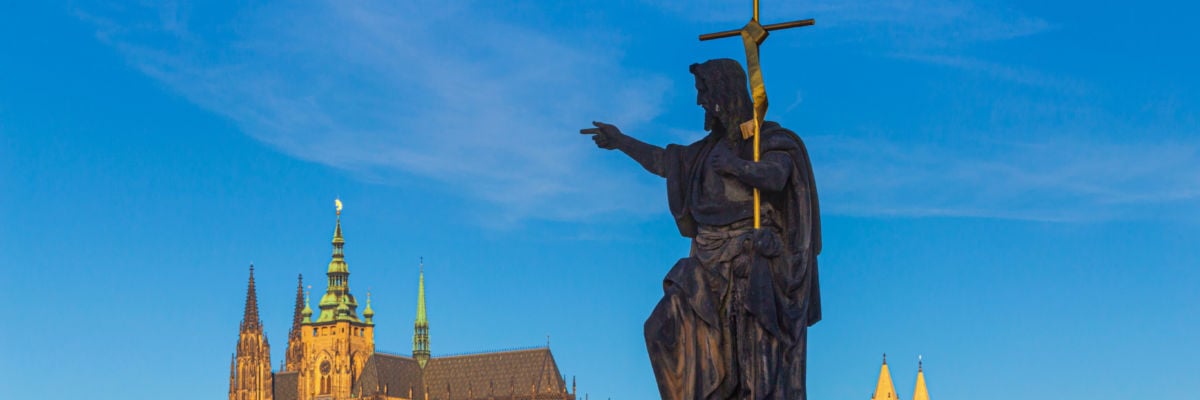
John the Baptist is probably the most interesting person in the New Testament. He was likely raised by the Essenes, a religious community living near the Dead Sea, and, when he showed up in the countryside near Jerusalem, he caused quite a stir. Imagine someone raised by a small family of survivalists in Montana preparing for the apocalypse—and all of a sudden, this person, who will inevitably be a little strange, shows up in Washington, preaching outdoors and telling all who see him that they’re going to hell.
That sort of thing does happen. There are plenty of crazy street preachers out there; if you spend enough time in any big city you’ll eventually see one. But for the most part, no one pays any attention to them. If you’re in the city and you see some dude with crazy eyes talking about how the world is going to end, you probably find an excuse to cross the street or act as though you’re on the phone.
Yet when John the Baptist shows up, people just can’t get enough. Just before our Gospel for today, he calls the crowds a brood of vipers. He tells them that they’re all going to be judged. And they don’t walk away. They beg him to help.
This is where our reading picks up. “What should we do?” they ask. Even the tax collectors and the Roman soldiers listen. Sadducees, Pharisees, they’re all there. They all come and ask him to baptize them in the river.
Why? Maybe John is just genuinely charismatic. Maybe God gives him this particular ability to draw people in. Maybe it’s the right place and the right time. I’m not sure that we can really know or understand everything about how John’s message works, but I think we can see this one thing: John doesn’t care who people are. He doesn’t care if you’re a political leader or a religious leader; he doesn’t care if you’re a corrupt businessman or an honest worker; he doesn’t care if you’re Roman or Jewish or something else. He just cuts right through all the identity politics of his time and says, look, All of you will be judged. God is less interested in your political or religious or social status than he is in how you live the life you have been given. You can be—and he uses this image—the biggest and most important tree in the forest, but if you don’t bear good fruit—in other words, if you just treat your status as something that you deserve—you will be cut down. Maybe not in this life. But certainly in the next.
This applies not just to the big important people. Everyone will be judged, not on who he is, or who his parents were, or how smart he was, but on how he lived. The instructions he gives to tax collectors and soldiers may have seemed radical to his audience, but nothing John says is in any way novel: it is the same thing said by the Torah and the whole prophetic tradition of Israel.
If we’re interested in meeting this Jesus who comes to us at Christmas, we need to pay attention. John the Baptist is the one sent ahead to pave the way. He’s the one there to help prepare us to meet God. This is a hard preparation, but it’s good for us. Because, in the end, God is God—which means: God isn’t really interested in all the excuses we come up with for not doing the right thing. God loves us. God loves us so much that he became man to prove that love. But God also loves us too much to accept the bad reasons we come up with for not living the good life he wants for us. And those reasons are not very different from the ones John met in the first century: religious status, political status, ethnic status, economic status.
I’m not saying we shouldn’t talk about these things or act as though they don’t exist. But when we rely on these things and make our whole identity about them, when we allow them to shape our whole existence, we lose touch with reality. This is the world that produces such absurdities as the liberal who speaks of human rights but thinks that babies should be killed whenever they are inconvenient, or the conservative who talks of family values and morality but refuses to discuss how the free market economy treats children merely as consumer objects. It’s a mess.
That is, I think, why John the Baptist was and is so important. It’s easy to repeat his doom and gloom, his pessimism and judgment. But there’s a positive message hidden there, which is why so many people came to hear him:
We can do this. Not on our own. We need God’s help. But with God’s help, we can move beyond these ways that we shield ourselves from reality; we can accept our identities and our histories in a way that opens rather than closes our relationships with others. And, most importantly, we can be ready to follow Jesus when he comes.
So, on this Gaudete Sunday, we can and should rejoice, because the Lord is coming to judge—which might seem frightening, except that he came first to be judged: the judge offered himself to the unjust judgment of the cross. This is to say that the kingdom of God is not some unattainable ideal; it is simply accepting the invitation of the judge whose unquenchable fire is his love. That is to say his judgment is his love, and his love is his judgment, which probably suggests that we do not know what love or judgment is in this life, as much as our culture likes fluctuating between both concepts. Even now, in the mysteries of the Church, we can live the future, and the past, in the present, by uniting ourselves to the sacraments, through which Christ our judge purifies us and judges us and transforms us for the fellowship of his kingdom.
The kingdom of God is more present for us than it was for John the Baptist; the work of the Son has been accomplished. Seek him today.



